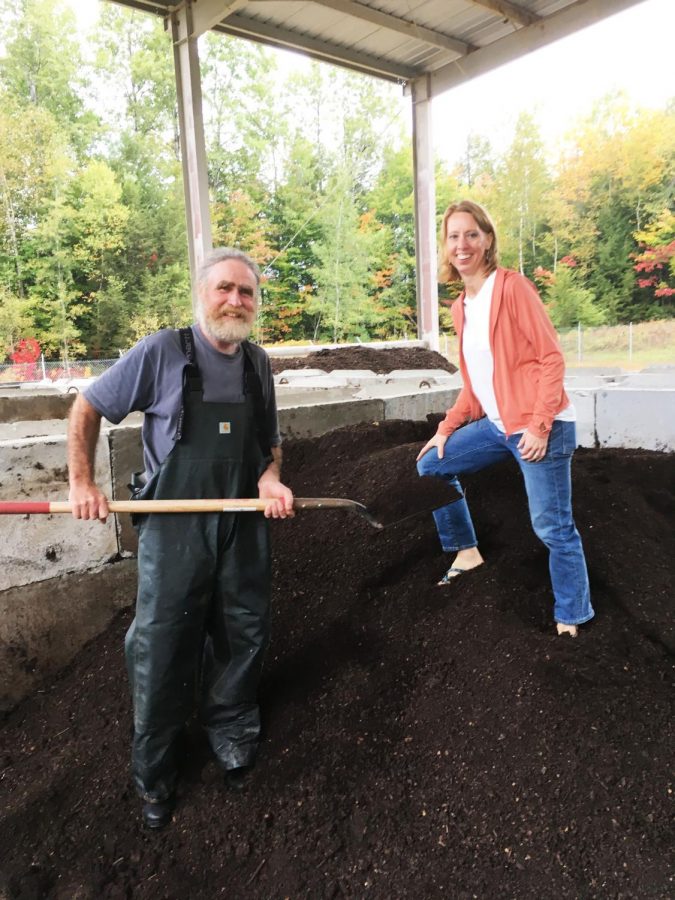Digging up dirt to clean up campus
Chris Duff and Elly Ventura at Lamoille Soil
Composting on campus has been successful despite a few missteps, including an incident during opening weekend when non-compostable material was found in four compost receptacles. The issue was that there were utensils and cups present that were made from a type of plastic known as bioplastic.
These materials are certified by the Biodegradable Products Institute to be allowed in commercial compost piles.
According to the outreach coordinator for The Lamoille Solid Waste District, Elly Ventura, “The BPI certification basically means that it is non-petroleum based plastic…A naturally-derived product that will break down in a compost pile that is not made from oil or nonrenewable resources.”
According to Tom Fondakowski, Black Dirt Farm, the company responsible for delivering the food scraps to Lamoille Soil to be composted, could not deliver compost totes at the time of the Convocation barbecue which contained bioplastic utensils.
According to an email from Lamoille Soil, “Prior approval is required for any serve ware (plates, straws, knives, and spoons) to be included in the tote(s), and all serve ware items must be listed on the Biodegradable Products Institute (BPI) ‘Certified Compostable Products List.’”
The items found in the totes could not be used in the compost. The reason? Black Dirt Farm does not normally accept bioplastics as a part of the food scraps at their Stannard, Vermont location.
According to the compost facility operator for The Lamoille Solid Waste District, Chris Duff, “They also have a compost facility in Stannard, and they do not accept BPI material at their place, mostly because of the opportunity for confusion and contamination from other products.” However, the situation was resolved quickly. According to a Sep. 3 email from Black Dirt Farm to Tom Fondakowski and Michael Stevens, Director of Facilities, “I know there has been quite a bit of confusion surrounding bioplastics, but the last communication between us all was that Lamoille Soil could not accept these items. However, I just got off the phone with Lamoille Soil and they agreed to accept bioplastics from NVU moving forward, provided they are passed by me for approval before being used.”
Despite this mistake, the composting program at this time was successful.
According to Fondakowski, “Family weekend barbeque we were very successful and I think that we had a dramatic, at least 50 percent improvement over the compost process, whereas our patrons that weekend really followed direction on the signs, and from what we heard, there was very minimal contamination of the compost…The compost bins were at least 99 percent compostable product and food,” Fondakowski said.
How does one know if an item is compostable? It helps to understand the compost process. At Lamoille Soil, the compost process happens this way; according to Duff, “The food scraps come in from Northern Vermont University via Black Dirt Farm, who hauls them for us. I have a bed of carbon material all prepared here for them, they will back in and dump the food scraps in.
The food scraps are high in nitrogen, so in order to have a successful microbe population in my compost pile so that it will heat and it will break down rapidly, I have to have a certain carbon to nitrogen ratio. So once I know how much food scraps came in, whether it is a ton or half a ton or two tons, I will balance that with the proper amount of carbon, in the form of wood chip, shredded paper, leaves, manures, hay—whatever it takes to bring that carbon ratio up to about 20 to 30 parts carbon to one part nitrogen.”
Ventura noted that composting is an activity that must be adopted by everyone in order to have an impact. “Everybody on campus should be participating and buying in and taking responsibility for the composting process,” Ventura said.
Determining if an item is compostable is done by making sure that the item is labeled as BPI certified or carries the ATSM 6400 designation.
Fondakowski said that while campus-wide composting efforts have been successful, continued success requires that everyone participate.
“Like anything that is sustainable, it takes a team effort, and our team would be the NVU-Johnson community, meaning it has to be facilities, food service, and our customers,” Fondakowski said.

Senior, Interdisciplinary Studies
Grew up in Johnson, VT
Fall 2019 - Present
My favorite food is cheesecake.




